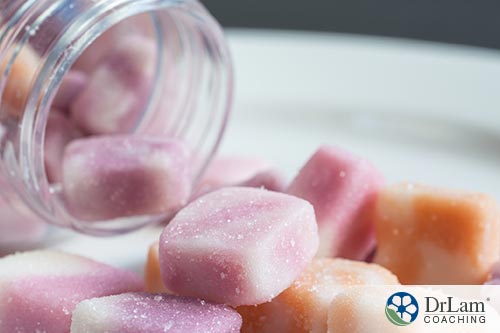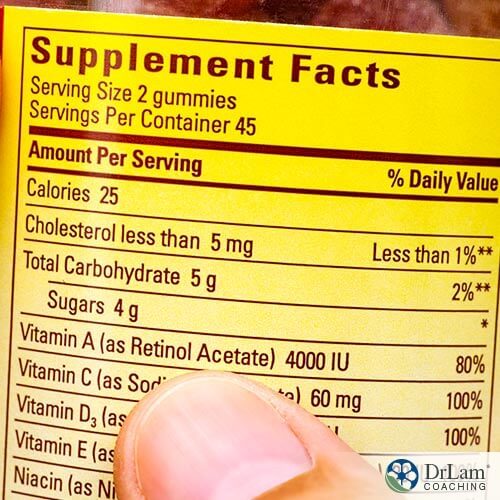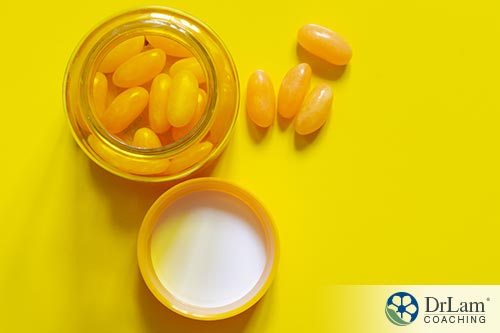 Many adults, and even some children, have no problem popping a pill. But it is not as easy with children or adults who find it difficult to swallow tablets. So, vitamin manufacturers came up with an easy solution – gummy vitamins! They are sweet and chewy, and more fun than pills too. But does that make them a great alternative?
Many adults, and even some children, have no problem popping a pill. But it is not as easy with children or adults who find it difficult to swallow tablets. So, vitamin manufacturers came up with an easy solution – gummy vitamins! They are sweet and chewy, and more fun than pills too. But does that make them a great alternative?
Gummy vitamins are easier to chew and more kids like them. Some adults even prefer the flavor. But they also have a lot of sugar and come with certain downsides. Plus, they are not all created equal.
Gummy vitamins can contain a variety of vitamins or just one or two. And like with regular vitamins, you need to read the packaging to find out the particulars of the gummy vitamins you consider purchasing. But what else do we find in gummy vitamins?
Besides the obvious vitamins advertised, gummy vitamins also often contain gelatin, corn starch, water, sugar, food colorings, and other additives. They also include a variety of sometimes artificial flavors that include cherry, raspberry, and orange.
Gummy vitamins have one potential health benefit in that they contain vitamins. But they usually have a lower vitamin content than you would find in tablet or soft-gel vitamins.
Children can still benefit from these vitamins. Because they are sweet and chewy, children are often more likely to take gummy vitamins.
People who have difficulty swallowing tablets or very sensitive stomachs may also find it easier to take soft, chewable vitamins.
The Food and Drug Administration (FDA) classifies gummy vitamins as food. This means they could contain fewer nutrients than a regular vitamin. Furthermore, they often contain substantial amounts of sugar, sugar alcohols, and food coloring.
High sugar consumption is linked to various health issues that include, amongst others, diabetes, heart disease, and obesity. It could also result in oral health issues.
Seeing that the average American child already tends to have a lot of sugar in their diet, adding to their daily sugar intake may not be such a good idea.
To circumvent sugar queries, many manufacturers of gummy vitamins add sugar alcohols. So, even though a brand may advertise its product as sugar-free, it is not necessarily the case. Sugar alcohols are often listed under carbohydrates on the packaging. Too many sugar alcohols are also known to cause digestive issues like diarrhea, bloating, nausea, and others.
And many gummy vitamins also contain food coloring. Much literature exists linking food colorings to adverse neurobehavior issues in children. These include, amongst others, hyperactivity, learning issues, restlessness, and inattentiveness. Adults may also experience these reactions.
 Because of all the additional ingredients in gummy vitamins, they often have a smaller vitamin dosage than regular vitamins.
Because of all the additional ingredients in gummy vitamins, they often have a smaller vitamin dosage than regular vitamins.
Furthermore, they have limited shelf-life stability. This means the longer they stand on the shelf, the more the vitamin strength wears off over time. So you stand a good chance of not really consuming what it states on the label.
Another point to consider is that it is easy to overdose on gummy vitamins because they taste like sweets. Besides an obvious sugar overload that could result in a sugar rush and other health complications, you also run the risk of consuming too much of a certain vitamin(s). The average American family already eats a diet fortified with vitamins and minerals. Many kinds of breakfast cereal, for example, advertise their added vitamin and mineral content. So eating too many vitamins could lead to vitamin or mineral toxicity that could do serious damage to your body.
Children, especially, are likely to overdose on gummy vitamins if they get a hold of a bottle, thinking the vitamins are like candy. And, they are also more susceptible to vitamin or mineral toxicity because they need less of these nutrients than adults. Some of these minerals and vitamins, like vitamins A and E, for example, get stored in your body fat or tissues when you consume too much of them.
Because the various ingredients in gummy vitamins may interact with certain medications, we also always advise people to only supplements under the advice of their healthcare professional. They are best able to determine the supplement’s suitability and dosage.
While needlessly taking any health supplement could cause a strain on your body’s detoxification system, it is much easier with gummy vitamins. This is because they are so easy to take. They are chewy and taste like sweets, so children, especially, are at risk of overdosing on them. This could have a detrimental effect on their body.
The Detoxification circuit makes up part of your body’s NeuroEndoMetabolic (NEM) stress response which is governed by the Hypothalamic-Pituitary-Adrenal (HPA) axis. In other words, your HPA tells your NEM what to do.
Your Detoxification circuit consists of your liver, extracellular matrix, and immune system. Together, they make sure that any toxic buildup in your body gets eliminated. These toxins add stress to your body and could ultimately contribute to adrenal fatigue if not taken care of.
The problem arises when your body goes into toxic overload and your detoxification system is unable to get rid of these toxins. This scenario could give rise to many symptoms that include, amongst others:
This is why, before taking gummy vitamins or any other vitamin or supplement, first talking to your healthcare professional is your best option. You may be considering a supplement but not really need one.
Following a healthy, balanced diet like the adrenal fatigue diet is your best option to make sure your body has all the vitamins and minerals it needs to stay healthy and function properly.
If you have to take vitamin supplements, rather opt for a regular one instead of gummy vitamins. You can get chewable vitamins if swallowing a tablet is a problem for you.
No healthcare professional will suggest you take vitamins if following a proper diet that ensures you get all the nutrients you need. They will only suggest it if they feel it absolutely necessary. And if they do suggest you take vitamins, talk through your various options. Gummy vitamins should only be taken if there is no other option available. At the end of the day, gummy vitamins are better than no vitamins, if needed.
 You should consider these vitamins a last resort, and only if needed. People included in this group are those who have difficulty taking normal vitamins. They are also those who have a nutrient deficiency, have a definite need for specific vitamins, or have absorption issues. People who experience trouble in swallowing tablets also qualify, as do children. But remember, this should not be the norm. Always try other vitamin options first.
You should consider these vitamins a last resort, and only if needed. People included in this group are those who have difficulty taking normal vitamins. They are also those who have a nutrient deficiency, have a definite need for specific vitamins, or have absorption issues. People who experience trouble in swallowing tablets also qualify, as do children. But remember, this should not be the norm. Always try other vitamin options first.
When choosing vitamins, always check the labels and make sure you understand what you are getting. Try to avoid sugar, and make sure you know about possible hidden information, like sugar alcohols hidden under the carbohydrate portion of the label. And remember, you may not even need a vitamin supplement unless your body is compromised in some way. The best way to get the nutrients you need to function at 100% is through your diet.
If considering gummy vitamins as a supplement, please consider the following:
Gummy vitamins can, to a certain extent, address nutrient deficiencies. But you should only consider them as a last resort. Many other vitamins or supplements on the market are better equipped to do so, without having as much sugar or additives as these sweet alternatives.